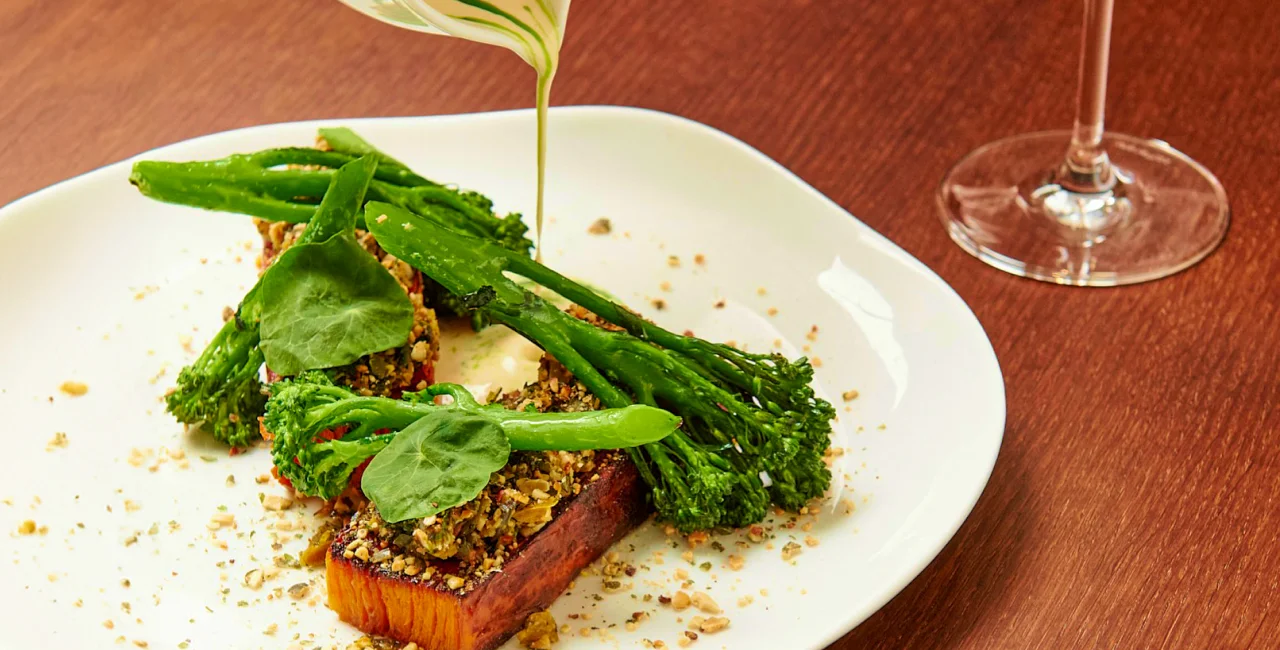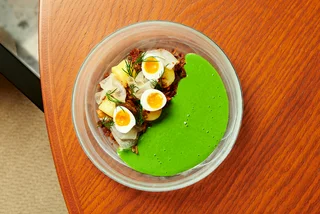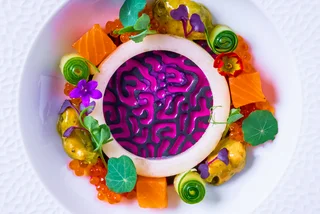In the heart of Prague, a culinary revolution is quietly taking root. Some of the city’s most esteemed establishments, from historic hotels to cutting-edge restaurants, are embracing plant-based cuisine with newfound fervor. This shift toward “green eating” is redefining Prague’s gastronomic identity, signaling a transformative moment for the Czech capital’s dining scene.
At the Almanac X Prague hotel, the Alcron Restaurant is pioneering a fresh culinary direction under the guidance of Head Chef Richard Bielik. Embracing a plant-forward philosophy, Bielik is showcasing vegetables, fruits, and other plant-based ingredients with innovative flair while still curating a selection of thoughtfully sourced meat and fish options.
PARTNER ARTICLE
“Our ‘plant-forward’ approach elevates vegetables and fruit while presenting beautiful, locally produced meat and fish. Where possible, in our vegetarian dishes, the concept involves limiting the use of animal products and focusing on the flavors of vegetables,” says Bielik.

This fresh perspective unveils a culinary revolution where everyday ingredients are transformed into high art: cabbage, kohlrabi, cauliflower, and root vegetables take center stage, each elevated to new heights of sophistication on the plate.
The menu showcases inventive small plates such as traditional Slovak sheep’s cheese with white chocolate and apricot purée, demonstrating how plant-based ingredients can achieve fine dining status. Other offerings include pickled watermelon with mint and cucumber gel, as well as pickled cherries with hazelnuts and lemon balm.
At Alcron, vegetarian dishes are more than a mere side note – they command their own spotlight. The menu features standout entrees such as stuffed cabbage leaves with mashed potatoes and chanterelle velouté, a sweet potato gratin with pumpkin seeds, and wild broccoli in buttermilk sauce. Grilled cauliflower is paired with inventive combinations like avocado with pomegranate, blue cheese, and truffle.
Bielik attributes the rising popularity of plant-forward dining to its health benefits and sustainability. “After eating this kind of food, you feel full and satisfied, but you still have energy. Your evening can continue after you finish your meal.”
Younger generation putting health first
“The world of vegetarians no longer belongs to the second track,” explains Tomáš Kohút, chef at Triton in the Adria Hotel in nearby Wenceslas Square, noting that sales of vegetarian dishes already make up 20 percent of all meals sold at his restaurant.
Kohút’s vegetarian creations include a mushroom tartar and acai-based dessert. Best sellers like vegetarian duck (celery with a vegetarian demi-glace, chickpea, and Daikon radish, sesame) and tomato vinegar tartlets excite the palate while incorporating ingredients with health-boosting properties.
As the younger generation increasingly prioritizes wellness, Kohút anticipates that plant-forward dining will become a defining feature of the Czech culinary scene. Beyond the nutritional benefits, he believes the trend contributes to restaurants' financial health.

"Vegetarian dishes will be at the forefront," Kohút predicts. "Looking at the numbers, we can say with certainty that the price of meat will be much, much higher. We will probably go back to the days of our grandmothers when 'better' food, which usually contained meat, was only served once a week."
Humble ingredients, elevated
At the newly opened Monastiq restaurant in the Mandarin Oriental hotel, chef Michal Horváth is also giving those grandmotherly ingredients top billing in vegetarian dishes spilling over with historical significance.
Leaning into the country's history of sugar-beet production, a salad of lamb's lettuce, beets, cress, and goat cheese pays homage to 19th-century industrialist Karl Weinrich, whose sugar factory in Dobrovica, on the estate of the noble Thurn-Taxis family, became known as one of the first to use sugar beets.
A main course of barley oats, green peas, lentils, red radish, and onion revives two recipes from 10th-century Jewish cuisine. The Marie B. entree, a poached egg with creamy dill sauce and parsley stuffing, was inspired by a recipe from Marie B. Svobodová’s pioneering cookbook, published in 1894.

By championing vegetables and sustainable practices, these chefs are not only paving the way for a future that prioritizes environmental stewardship but also bringing traditional Czech food into the 21st century.
“Czech society can be slightly more conservative when it comes to food,” says Alcron's Bielik. “But when people experience these types of dishes, they make a really big impression.”












 Reading time: 3 minutes
Reading time: 3 minutes 

























